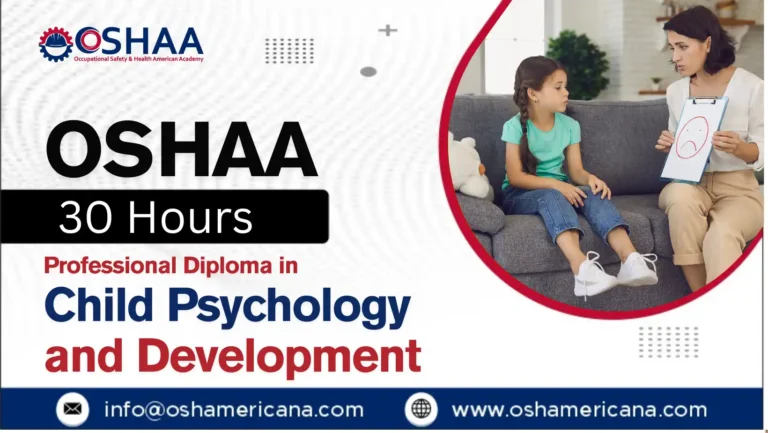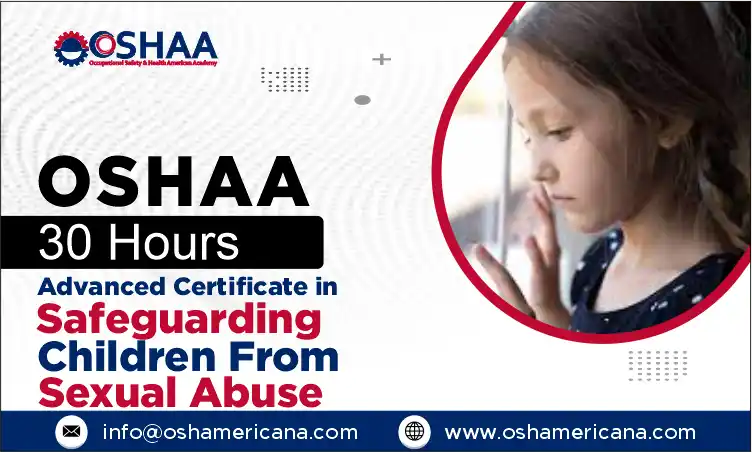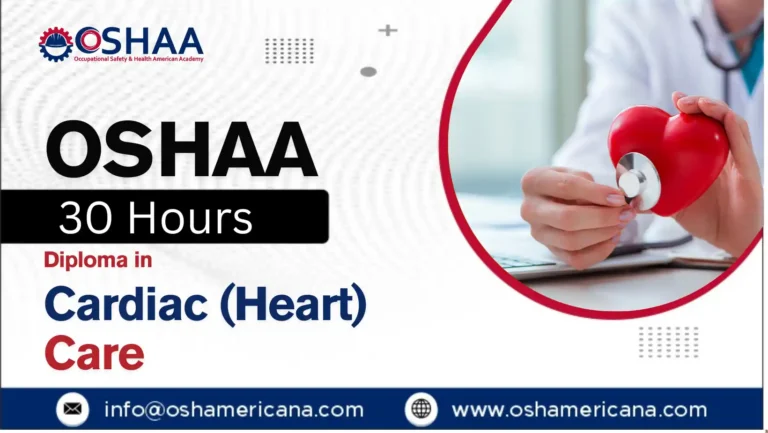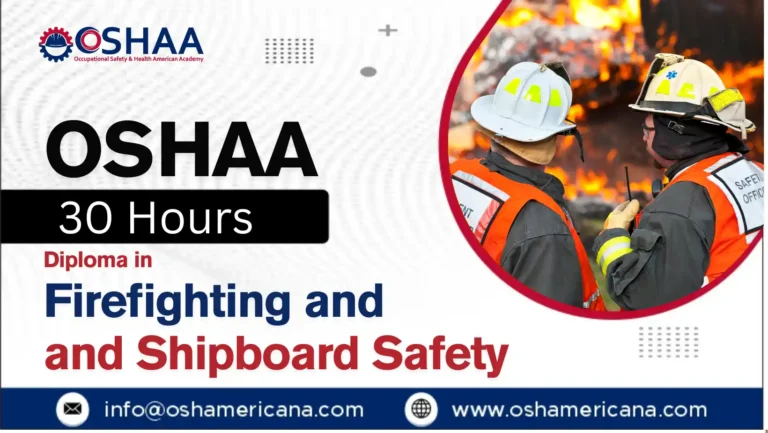Enhance your emergency response skills with the OSHAA 30-Hours Professional Diploma in Paediatric First Aid, ensuring child safety, compliance, and caregiving excellence.
The OSHAA 30-Hours Professional Diploma in Paediatric First Aid is a meticulously designed program that provides caregivers, parents, teachers, and healthcare professionals with the advanced skills required to respond effectively to emergencies involving children. In any childcare, educational, or healthcare environment, accidents and medical incidents can occur unexpectedly, and the ability to act promptly and competently is crucial. The OSHAA 30-Hours Professional Diploma in Paediatric First Aid diploma equips participants with both theoretical knowledge and practical expertise to deliver safe, efficient, and compliant first aid care in paediatric settings.
This comprehensive course covers a wide spectrum of emergency scenarios specific to children, ranging from minor injuries, cuts, and burns to severe, life-threatening conditions such as choking, allergic reactions, and respiratory distress. Participants learn to assess situations accurately, implement evidence-based first aid protocols, and stabilize young patients until professional medical assistance is available. The OSHAA 30-Hours Professional Diploma in Paediatric First Aid is aligned with international safety standards and regulatory requirements, ensuring learners meet the compliance expectations of healthcare facilities, schools, childcare centers, and other child-focused environments.
By integrating structured theoretical instruction with hands-on practical exercises, the course emphasizes child-specific first aid techniques, risk assessment, emergency response planning, and effective communication with children and caregivers during critical situations. Participants gain experiential knowledge that fosters confidence, precision, and professionalism in responding to paediatric emergencies. The OSHAA 30-Hours Professional Diploma in Paediatric First Aid program ensures that learners not only understand the principles of paediatric first aid but also can apply them decisively and safely under pressure.
The OSHAA 30-Hours Professional Diploma in Paediatric First Aid is invaluable for anyone responsible for the wellbeing and safety of children. Whether you are a parent seeking to enhance family safety, a teacher managing classroom incidents, or a healthcare professional providing clinical care, this course equips you with the essential skills to prevent harm, manage emergencies effectively, and maintain a secure environment.
Completion of the OSHAA 30-Hours Professional Diploma in Paediatric First Aid diploma strengthens individual capability while promoting a culture of safety, regulatory compliance, and operational excellence in childcare and healthcare settings. By undertaking the OSHAA 30-Hours Professional Diploma in Paediatric First Aid, learners enhance their professional development, refine their caregiving expertise, and gain the confidence to respond promptly and effectively to any paediatric emergency, solidifying their role as a responsible and competent guardian of child health.
The OSHAA 30-Hours Professional Diploma in Paediatric First Aid ensures that participants leave with recognized qualifications, advanced emergency response skills, and the knowledge necessary to uphold the highest standards of child safety, making it an essential training for all professionals and caregivers involved in paediatric care.
OSHAA 30-Hours Professional Diploma in Paediatric First Aid
To enroll in the OSHAA 30-Hours Professional Diploma in Paediatric First Aid, learners are expected to meet the following criteria:
- Age Requirement
- Participants must be at least 18 years of age to ensure the maturity and responsibility required for paediatric first aid training.
- Meeting the minimum age requirement allows learners to fully engage with both theoretical and practical components of the OSHAA 30-Hours Professional Diploma in Paediatric First Aid.
- The course is designed for adult learners who can apply critical thinking and decision-making skills in emergency scenarios involving children.
- Educational Background
- A minimum of secondary education or equivalent is recommended for enrollment in the OSHAA 30-Hours Professional Diploma in Paediatric First Aid.
- Learners with higher education in healthcare, early childhood education, nursing, or related fields will benefit from an enhanced understanding of course concepts.
- Foundational education ensures that participants can comprehend detailed first aid protocols, child anatomy and physiology, and emergency response techniques effectively.
- Work Experience
- Prior work experience in childcare, healthcare, teaching, or related sectors is recommended but not mandatory for the OSHAA 30-Hours Professional Diploma in Paediatric First Aid.
- Practical experience enhances the ability to contextualize training within real-world child care and clinical environments.
- Learners with hands-on experience will find it easier to integrate course principles into daily practices, increasing the effectiveness of their paediatric emergency response.
- English Proficiency
- Learners must have the ability to read, write, and communicate in English to fully engage with the course materials, assessments, and regulatory guidelines.
- Proficiency in English ensures clear understanding of paediatric first aid terminology, emergency procedures, and compliance standards covered in the OSHAA 30-Hours Professional Diploma in Paediatric First Aid.
- Effective communication skills also support collaboration with colleagues, caregivers, and healthcare professionals during critical situations.
By meeting these eligibility requirements, participants are fully prepared to maximize the learning experience and gain the comprehensive knowledge, practical skills, and professional certification offered through the OSHAA 30-Hours Professional Diploma in Paediatric First Aid, enhancing their ability to ensure child safety, comply with regulatory standards, and respond confidently in emergency scenarios.
Study Units
Learning Outcomes
The OSHAA 30-Hours Professional Diploma in Paediatric First Aid is meticulously designed to equip learners with advanced skills, critical knowledge, and leadership abilities required to manage paediatric emergencies confidently.
By completing the OSHAA 30-Hours Professional Diploma in Paediatric First Aid course, participants gain comprehensive expertise in child-focused first aid, ensuring compliance with international safety standards, regulatory requirements, and OSHA guidelines, while enhancing overall emergency preparedness in healthcare, childcare, and educational settings. The learning outcomes are structured to ensure learners develop practical competencies and professional judgment essential for safeguarding children in a variety of scenarios.
- Introduction to Paediatric First Aid (3 hours)
- Understand the principles and importance of paediatric first aid within healthcare, childcare, and educational environments.
- Recognize the roles and responsibilities of a certified paediatric first aid provider under OSHA and international safety standards.
- Identify common paediatric emergencies and apply structured response protocols to ensure immediate and effective care.
- Develop an awareness of risk assessment and preventive strategies to minimize accidents and injuries among children.
- Basic Life Support (BLS) for Infants and Children (4 hours)
- Demonstrate essential BLS techniques for infants and children, including chest compressions and rescue breaths.
- Apply age-appropriate airway management strategies to restore and maintain effective breathing and circulation.
- Evaluate and respond to cardiac emergencies with adherence to recognized protocols for paediatric BLS.
- Enhance skills in using automated external defibrillators (AEDs) safely and effectively in child-specific scenarios.
- Choking in Children (3 hours)
- Identify the signs and symptoms of choking in infants and children and distinguish between partial and complete airway obstruction.
- Execute appropriate emergency interventions, including back blows, chest thrusts, and abdominal thrusts.
- Demonstrate the ability to adapt interventions for different age groups, ensuring safety and efficacy.
- Understand post-intervention monitoring and follow-up procedures to prevent further complications.
- Treating Burns, Scalds, and Wounds (4 hours)
- Recognize the types and severity of burns, scalds, and wounds in children and implement immediate first aid interventions.
- Apply safe techniques for cleaning, dressing, and protecting injuries to prevent infection and promote healing.
- Understand the importance of pain management and emotional support when treating injured children.
- Incorporate proper reporting and documentation of injuries in compliance with healthcare and childcare regulations.
- Managing Head Injuries and Concussions (3 hours)
- Assess and identify symptoms of head injuries and concussions in paediatric patients.
- Apply first aid procedures to stabilize children while preventing further injury.
- Monitor vital signs and neurological indicators to determine when advanced medical care is required.
- Understand the importance of follow-up care, observation, and parental guidance following head injuries.
- Dealing with Allergic Reactions and Anaphylaxis (4 hours)
- Identify common allergens and recognize early warning signs of mild to severe allergic reactions in children.
- Administer emergency interventions, including epinephrine auto-injectors, following standard protocols.
- Develop skills for rapid assessment and decision-making during life-threatening allergic emergencies.
- Educate caregivers and staff on allergy prevention, monitoring, and emergency response planning.
- Seizures and Epilepsy in Children (5 hours)
- Recognize different types of seizures and their manifestations in paediatric patients.
- Apply first aid measures to protect children during seizures and prevent injury.
- Understand the triggers, management strategies, and emergency response protocols for epilepsy.
- Coordinate with healthcare providers and caregivers to ensure ongoing safety and effective care plans.
- Managing Asthma and Respiratory Emergencies (4 hours)
- Identify symptoms of asthma attacks and other respiratory emergencies in children.
- Administer appropriate interventions, including inhalers and oxygen therapy, according to paediatric guidelines.
- Monitor respiratory status and implement follow-up care to prevent deterioration.
- Promote proactive asthma management strategies and educate caregivers on prevention and emergency response.
Completing the OSHAA 30-Hours Professional Diploma in Paediatric First Aid ensures that participants are fully prepared to lead safety initiatives, implement compliance-driven protocols, and foster a strong culture of child safety in their workplaces. By mastering these learning outcomes, learners acquire the practical skills, professional knowledge, and confidence needed to respond effectively to a wide range of paediatric emergencies, enhancing patient safety, regulatory adherence, and overall operational excellence.
The OSHAA 30-Hours Professional Diploma in Paediatric First Aid provides healthcare professionals, educators, caregivers, and childcare workers with comprehensive training designed to enhance their knowledge, skills, and competencies in managing paediatric emergencies. The OSHAA 30-Hours Professional Diploma in Paediatric First Aid course delivers critical expertise that ensures compliance with international safety standards, OSHA guidelines, and best practices in child-focused first aid.
By completing the OSHAA 30-Hours Professional Diploma in Paediatric First Aid, participants gain advanced skills, improve workplace safety, and are empowered to respond confidently and effectively to a wide range of paediatric emergencies, ensuring optimal outcomes for children under their care.
- Enhanced Knowledge and Skill Development
- Gain in-depth understanding of paediatric first aid principles, emergency response protocols, and child-specific care techniques.
- Develop practical skills in handling medical emergencies, including choking, burns, seizures, and respiratory crises.
- Strengthen decision-making abilities in high-pressure scenarios to deliver rapid and effective care.
- Regulatory Compliance and Legal Assurance
- Ensure adherence to OSHA regulations and international paediatric first aid standards.
- Acquire knowledge of legal responsibilities and documentation requirements in child care settings.
- Reduce organizational liability by applying certified protocols during emergencies.
- Improved Workplace Safety
- Minimize risks and prevent incidents through proactive first aid and emergency preparedness.
- Implement safety strategies tailored to childcare, educational, and healthcare environments.
- Promote a culture of safety and vigilance among staff and caregivers.
- Professional Development and Career Advancement
- Enhance your credentials and professional profile with a recognized qualification in paediatric first aid.
- Open opportunities for advancement in healthcare, childcare, education, and community services.
- Demonstrate commitment to continuous learning and specialized emergency care training.
- Emergency Preparedness and Response Readiness
- Prepare for a wide range of paediatric emergencies with structured response plans.
- Build confidence in assessing situations, prioritizing interventions, and applying life-saving techniques.
- Ensure rapid, coordinated responses that improve patient outcomes.
- Reduction of Incidents and Risk Mitigation
- Learn to identify early warning signs and prevent accidents before they escalate.
- Apply risk assessment methods to maintain safer environments for children.
- Strengthen overall emergency management capabilities within organizations.
- Leadership and Team Management Skills
- Develop skills in leading and coordinating emergency response teams.
- Enhance communication and collaboration among staff, caregivers, and healthcare professionals.
- Foster a proactive and responsive safety culture within your organization.
- Enhanced Patient and Child Wellbeing
- Improve immediate care for children experiencing medical emergencies.
- Support physical, emotional, and psychological wellbeing during and after incidents.
- Promote a child-centered approach that prioritizes safety and comfort.
- Operational Efficiency and Cost Savings
- Reduce the impact of emergencies on organizational resources through effective first aid management.
- Minimize prolonged hospital stays, complications, and associated costs.
- Streamline incident response processes to ensure timely interventions.
- Continuous Improvement and Innovation in Care
- Stay updated with best practices, new protocols, and evidence-based approaches in paediatric first aid.
- Implement innovative techniques and tools to enhance emergency preparedness.
- Contribute to ongoing improvement in organizational safety policies and child care standards.
- Global Relevance and Applicability
- Gain knowledge applicable to international childcare, education, and healthcare settings.
- Ensure compliance with globally recognized first aid standards and guidelines.
- Expand professional mobility with skills recognized across countries and sectors.
- Enhanced Communication and Education Skills
- Learn to educate parents, caregivers, and colleagues on paediatric first aid practices.
- Develop effective communication strategies for emergency situations and preventative care.
- Promote awareness and understanding of child safety protocols in your professional environment.
- Preparedness for Specialized Medical Scenarios
- Handle specific emergencies such as anaphylaxis, asthma attacks, seizures, and cardiac issues in children.
- Gain confidence in applying both preventive measures and immediate interventions.
- Improve overall outcomes through timely and appropriate emergency response.
- Support for Organizational Compliance and Reputation
- Demonstrate a commitment to high safety standards in childcare and healthcare settings.
- Enhance the reputation of your organization by ensuring staff are trained in certified paediatric first aid.
- Meet regulatory requirements for emergency care and maintain professional credibility.
- Long-Term Impact on Professional Growth
- Equip yourself with lifelong skills that enhance competence in emergency care and child safety.
- Build a foundation for advanced certifications, leadership roles, and specialized healthcare positions.
- Reinforce personal confidence, professional credibility, and the ability to deliver exceptional care.
The OSHAA 30-Hours Professional Diploma in Paediatric First Aid empowers participants with the knowledge, skills, and practical expertise required to excel in child-focused emergency care. By completing the OSHAA 30-Hours Professional Diploma in Paediatric First Aid course, learners are prepared to ensure compliance with safety standards, reduce risks, and lead effective first aid initiatives, resulting in safer environments, improved child wellbeing, and enhanced professional performance.
The OSHAA 30-Hours Professional Diploma in Paediatric First Aid is specifically designed for individuals and professionals involved in the care, supervision, and safety of children. The OSHAA 30-Hours Professional Diploma in Paediatric First Aid course is highly relevant to industry professionals, healthcare providers, educational institutions, childcare organizations, and stakeholders seeking to enhance their compliance with OSHA standards, improve workplace safety, and develop advanced skills in paediatric emergency response.
By participating in the OSHAA 30-Hours Professional Diploma in Paediatric First Aid, learners gain practical knowledge, professional competence, and the confidence to handle child-focused emergencies effectively, ensuring both safety and operational excellence.
- Healthcare Professionals
- Nurses, paramedics, and medical practitioners responsible for pediatric care.
- Relevant because it equips them with advanced first aid skills tailored to children.
- Enhances ability to respond to medical emergencies, improving patient safety and outcomes.
- Supports OSHA compliance and adherence to medical safety protocols.
- Childcare Providers and Early Years Educators
- Daycare staff, nursery workers, and preschool teachers who oversee young children.
- Relevant as it ensures they are trained to manage emergencies within childcare environments.
- Develops competence in paediatric emergency interventions and preventive safety measures.
- Strengthens operational efficiency and compliance with workplace safety standards.
- School Teachers and Educational Staff
- Teachers and school support staff responsible for student wellbeing.
- Relevant because emergencies can occur in classroom or school settings.
- Builds skills to identify risks, apply first aid, and manage children during incidents.
- Ensures schools meet regulatory safety requirements and promote a safe learning environment.
- Parents and Guardians
- Individuals caring for children at home or in community settings.
- Relevant to provide essential knowledge for immediate response to accidents and emergencies.
- Enhances confidence and practical skills in child-focused first aid.
- Promotes family safety awareness and reduces risks in home environments.
- Social Workers and Child Welfare Officers
- Professionals involved in child protection, welfare, and support services.
- Relevant as they encounter children in vulnerable situations where emergency preparedness is critical.
- Strengthens ability to manage pediatric emergencies effectively and safely.
- Supports compliance with health, safety, and safeguarding regulations.
- Healthcare Facility Administrators
- Managers and supervisors in hospitals, clinics, and pediatric centers.
- Relevant to ensure staff are trained in certified paediatric first aid procedures.
- Enhances operational safety, staff competency, and quality of care provided.
- Supports organizational compliance with OSHA and international healthcare safety standards.
- Sports Coaches and Activity Leaders
- Professionals overseeing children in sports, extracurricular activities, and recreational programs.
- Relevant as physical activities increase the risk of injuries and emergencies.
- Develops skills to respond promptly to accidents, choking, and respiratory issues.
- Ensures safety compliance during organized activities and reduces liability risks.
- Community and Volunteer Workers
- Individuals volunteering in child-focused programs, shelters, or community centers.
- Relevant to equip them with essential emergency response knowledge and first aid skills.
- Enhances ability to handle emergencies, safeguard children, and implement preventive measures.
- Supports adherence to health and safety regulations in community programs.
- Emergency Response and Rescue Personnel
- Paramedics, first responders, and emergency service teams dealing with pediatric cases.
- Relevant to provide specialized first aid interventions for infants and children.
- Builds expertise in advanced emergency response and pediatric life-saving techniques.
- Ensures compliance with OSHA guidelines and enhances operational efficiency during emergencies.
- Healthcare Trainers and Educators
- Professionals responsible for delivering health, safety, and first aid training.
- Relevant to expand their knowledge and certification credentials in paediatric first aid.
- Enhances ability to teach practical, OSHA-compliant first aid skills to diverse audiences.
- Strengthens program credibility, safety standards, and learner outcomes across organizations.
The OSHAA 30-Hours Professional Diploma in Paediatric First Aid equips participants across all roles with comprehensive knowledge, advanced professional skills, and recognized certification, enabling them to enhance child safety, maintain regulatory compliance, and drive operational excellence in any professional or caregiving setting. By completing the OSHAA 30-Hours Professional Diploma in Paediatric First Aid course, learners are prepared to confidently lead safety initiatives, ensure effective emergency responses, and foster a strong culture of child-centered safety and care.







